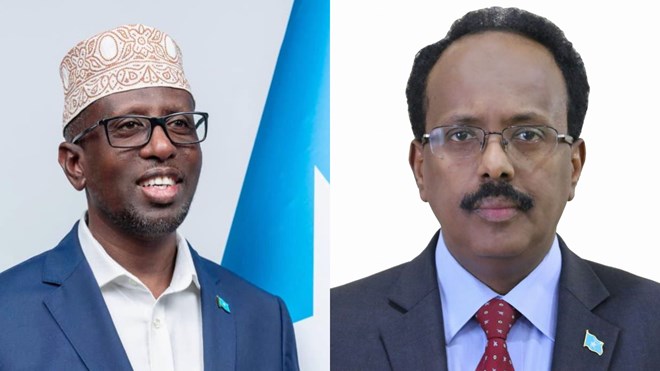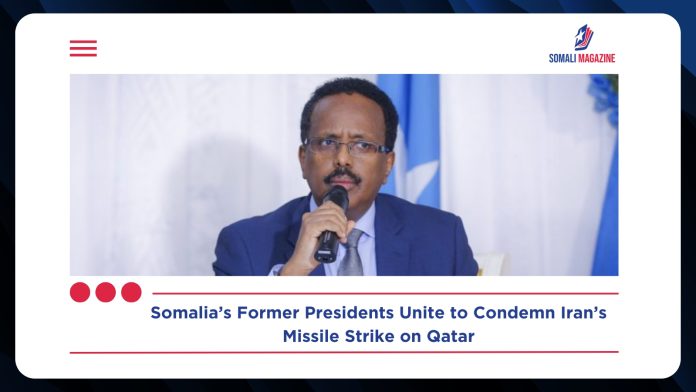Facebook Twitter (X) Instagram Somali Magazine - People's Magazine
Former Somali presidents Mohamed Abdullahi Farmaajo and Sharif Sheikh Ahmed have strongly condemned Iran’s recent missile strike on Qatar, calling it a dangerous escalation that violates international law and threatens peace in the Gulf and beyond. The condemnation follows Iran’s ballistic missile attack on Al Udeid Air Base, a key U.S. military installation in Qatar, amid rising tensions in the Middle East.
In separate statements issued shortly after the strike, both former leaders expressed alarm over the use of force against what they described as a peaceful and sovereign state. Farmaajo, who served as Somalia’s president from 2017 to 2022 and now resides in Doha, described the attack as “a blatant violation of international law” and warned that it could further destabilize an already volatile region.
“I strongly condemn the Iranian aggression against Qatar that took place today,” Farmaajo said in a statement posted on social media. “Launching missiles at the peaceful State of Qatar is a violation of international law. It also risks further escalating existing regional and global tensions. Iran must refrain from these illegal acts.”
Sharif Sheikh Ahmed, who led Somalia from 2009 to 2012, echoed those sentiments in a separate message, calling the missile strike “unacceptable and unjustifiable.” He emphasized that the attack not only endangered Qatar but also posed a broader threat to peace across the Muslim world. “As Muslim leaders, we must stand against such hostility and promote dialogue and mutual respect among nations,” he said.
The missile strike, which targeted Al Udeid Air Base late Monday, was reportedly part of Iran’s retaliation for recent U.S. airstrikes on its nuclear facilities. While Qatari and U.S. officials confirmed that all incoming missiles were intercepted and no casualties were reported, the attack has sparked widespread condemnation from Washington and its Gulf allies.

Somalia, though not directly involved in the conflict, maintains strong diplomatic and economic ties with Qatar. During Farmaajo’s presidency, Somalia resisted pressure from rival Gulf states to sever relations with Doha during the 2017 Gulf diplomatic crisis. His administration’s close alignment with Qatar was seen as a defining feature of its foreign policy, with Doha providing financial aid, infrastructure support, and military assistance during a period of political and security challenges in Somalia.
The former presidents’ statements reflect not only their personal ties to Qatar but also Somalia’s broader interest in regional stability. Analysts note that any escalation in the Gulf could have ripple effects across the Horn of Africa, where Gulf states have invested heavily in ports, infrastructure, and security partnerships.
The Iranian strike has also reignited concerns about the militarization of regional disputes and the potential for broader conflict. While Iran framed the attack as a response to aggression against its sovereignty, critics argue that using Qatari territory to settle scores with the U.S. places innocent civilians and regional allies at risk.
Both Farmaajo and Sharif called for immediate de-escalation and urged all parties to return to the negotiating table. “The time for diplomacy is now,” Sharif said. “We must not allow this conflict to spiral further and distract from the pressing challenges facing our region and the Muslim world.”
As tensions continue to mount, Somalia’s former leaders have joined a growing chorus of voices calling for restraint, dialogue, and respect for international norms. Their unified stance underscores the importance of regional solidarity in the face of rising geopolitical instability.

